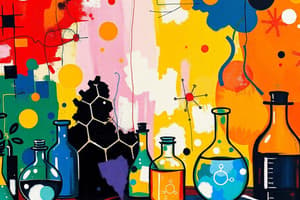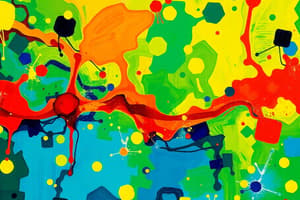Podcast
Questions and Answers
Hot glass looks the same as cold glass.
Hot glass looks the same as cold glass.
True (A)
All chemicals in the lab are to be considered dangerous.
All chemicals in the lab are to be considered dangerous.
True (A)
Return all unused chemicals to their original containers.
Return all unused chemicals to their original containers.
False (B)
Work areas should be kept clean and tidy.
Work areas should be kept clean and tidy.
Laboratory work can be started immediately upon entering the laboratory even if the instructor is not yet present.
Laboratory work can be started immediately upon entering the laboratory even if the instructor is not yet present.
Never remove chemicals or other equipment from the laboratory.
Never remove chemicals or other equipment from the laboratory.
Chipped or cracked glassware is okay to use.
Chipped or cracked glassware is okay to use.
Read all procedures thoroughly before entering the laboratory.
Read all procedures thoroughly before entering the laboratory.
All unauthorized experiments are prohibited.
All unauthorized experiments are prohibited.
You are allowed to enter the chemical preparation/storage area any time you need to get an item.
You are allowed to enter the chemical preparation/storage area any time you need to get an item.
Laboratory aprons should be worn during all lab activities.
Laboratory aprons should be worn during all lab activities.
Never leave a lit burner unattended.
Never leave a lit burner unattended.
Flashcards are hidden until you start studying
Study Notes
Laboratory Safety Guidelines
- Hot and cold glass can appear identical, posing burn risks.
- Treat all chemicals in the lab as potentially dangerous to ensure safety.
- Unused chemicals should not be returned to their original containers due to contamination risks.
- Maintain cleanliness and organization in work areas to prevent accidents.
- Pipets should never be filled using the mouth; use proper suction devices instead for safety.
- Laboratory activities should only begin when the instructor is present to ensure guidance and safety.
- Chemicals and equipment must remain within the laboratory; removal is strictly prohibited.
- Do not use chipped or cracked glassware as it can break and cause injuries.
- Read all procedure manuals thoroughly before entering the laboratory to understand safety protocols.
- Unauthorized experiments are banned to maintain safety and order in the lab.
- Access to the chemical storage area should be restricted; enter only when permitted and necessary.
- Always wear laboratory aprons during experiments to protect skin and clothing from spills and splashes.
- Broken glass should be cleaned up using appropriate tools (e.g., a broom and dustpan), not bare hands, to avoid cuts.
- Lit burners must never be left unattended to prevent fire hazards.
Studying That Suits You
Use AI to generate personalized quizzes and flashcards to suit your learning preferences.



